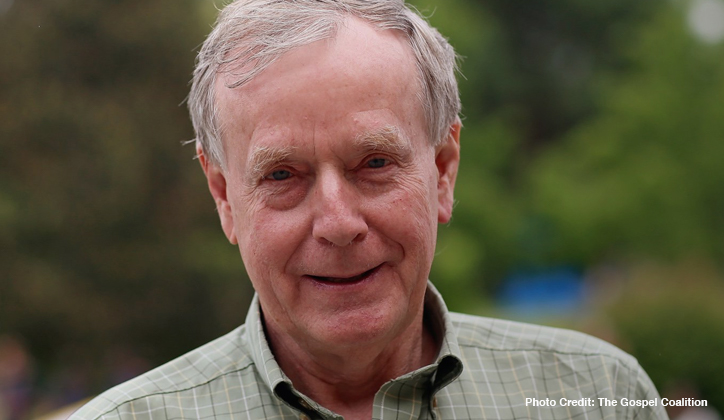Two weeks ago, I returned home from the funeral of David Powlison. Walking in our front door, I strode into the kitchen and grabbed a refrigerator magnet embossed with the Disney Logo. Immediately, I posted David’s picture from the funeral service program on our refrigerator. If you haven’t seen it, check it out below.
It hangs on the door right outside the dairy shelf. David smiles at me each morning when I grab the milk for cereal and he grins at me again each evening when I pillage the fridge for a late-night snack. I’m glad he’s there, because it’s kept me thinking about the impact of his life on so many around the globe. While I’m just one tiny voice in the chorus of loved ones, family, colleagues, and friends, seeing his picture each day has encouraged me to share my remembrance of David publicly. I want my friends who read the content I write regularly to hear this.
Here’s why I’m grateful for David’s life and friendship.
Brokenness is Broader Than Sin
It was from David’s life and teachings that I learned that brokenness is broader than sin. David certainly located the human heart and its active desires at the center of his anthropology. But it was from David that I first learned of the significant influences of genetic predispositions, of issues that arise from our family of origin, and of the impact of social systems—whether those be in society or in the spiritual realm. Heck, I think the first book David ever published was on the nature of demonic influences.
When I went to David with a question or in need of counsel, I rarely walked away without thinking, “I learned something. I never thought about it that way before.” In his thinking about how people grown and change, David was wholistic before it was cool to carry that label.
Though he was a skilled theologian, there was no box for David’s thinking. He would read deeply, mining truth from scholars of contrarian perspectives as he sought out what he really believed. The result was pastoral circumspection, studied insights, and an ability to nuance a truth until it surrendered new treasure. For David, there was no party line. He may have left his surfboard in Hawaii to attend Harvard, but he took his bohemian, his artful way of defying social conventions, with him. That’s why I love the picture below. David ran in classical circles, but he was pure jazz.
There’s some irony here. I’ve had experiences in my travels where a few people I’ve met seem to paste David Powlison or the CCEF stream of biblical counseling that he represented as some kind of sin-centered, motive-hounding, oversimplifying pack of reductionists. It’s not that I don’t understand this critique. There were some first-generation strains of biblical counseling (and some contemporary confusion too, for that matter) that narrowed human brokenness to the sinful heart alone. Honestly, that’s a path I stumbled down myself in the early years of ministry. But by God’s grace, it was David and others like him in the CCEF mold of thinking that moved me away from oversimplifying people and their problems. I’m forever grateful to God for the way David provoked me to see people as more than their sin and, when I’m trying to help them grow, to care for them in a wholistic way.
Fully Present, Surgically Helpful
I experienced David Powlison in a number of different roles. As a professor at Westminster Theological Seminary, as a subordinate in my role as Chairman of the CCEF board, as the president of CCEF, as an acquaintance turned friend during a time when I served in a church that wasn’t too far away from CCEF’s headquarters, and finally, as a broken man who needed wise counsel to make sense of the absurdities of life and ministry.
Not everyone knew that David was, from birth, deaf in one ear. But what that guy did with one ear overshadows, by a long shot, what most of us accomplish with both. With his head tilted slightly to aim his good ear at your pain, David would listen attentively, intelligently, compassionately, objectively, and empathetically. He would always be locked in so that you knew, in that moment, your troubled soul was at the center of his world.
Long pauses or reflective silence were not uncommon when engaging David in counsel or conversation. He didn’t just listen. David processed, and then he eventually spoke. He was the human embodiment of James 1:19, “Let every person be quick to hear, slow to speak, slow to anger”.
But when David finally spoke, it was time to take notes. For David, his careful listening was a precursor to his reflective, surgical, gracious, and Bible-saturated responses. David distinguished himself in the academy, and he was seen as a preeminent thought leader within biblical counseling. But when David was caring for your soul, he was nothing more than a humble fellow struggler.
David was quick to level the playing field by connecting his own experience with your temptations. He was circumspect in acknowledging other significant influences before he would drop some precise passage or promise upon you to ponder in the days ahead. Many people who counsel others are good listeners. But with David, there was an intangible quality of goodness and godliness conveyed in a dialect of meekness that elevated the force and potency of what he said. I think it was for that reason that David loved counseling others. Though he’d never assign this to himself, I’d apply this adapted version of Eric Liddell’s famous quote to David’s life: “God made me wise. And when I counsel people, I feel God’s pleasure.”
I already miss David, but I look forward to seeing how the event of his passing stokes the next generation of biblical counselors to take up his mantle, to give their lives in helping people, and to experience God’s pleasure as they do.
David’s life is over, but the light he carried remains. May we see the light as clearly as David, and then lead and love in a way that magnifies its source.
“For God, who said, “Let light shine out of darkness,” has shone in our hearts to give the light of the knowledge of the glory of God in the face of Jesus Christ” (2 Corinthians 4:6).
In memory of Dr. David Powlison (1949–2019)









